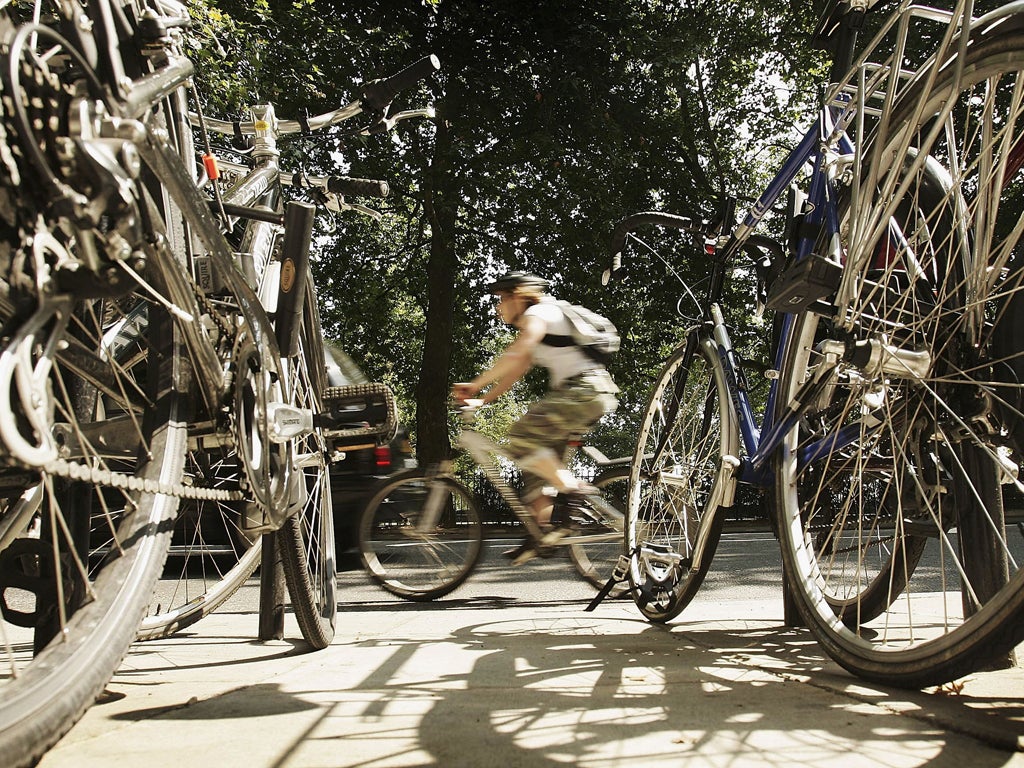Want to preserve your health? Get on your bike, say experts
Cycling and walking are in decline, according to the National Institute for Health and Clinical Excellence and the trend must be reversed

Your support helps us to tell the story
From reproductive rights to climate change to Big Tech, The Independent is on the ground when the story is developing. Whether it's investigating the financials of Elon Musk's pro-Trump PAC or producing our latest documentary, 'The A Word', which shines a light on the American women fighting for reproductive rights, we know how important it is to parse out the facts from the messaging.
At such a critical moment in US history, we need reporters on the ground. Your donation allows us to keep sending journalists to speak to both sides of the story.
The Independent is trusted by Americans across the entire political spectrum. And unlike many other quality news outlets, we choose not to lock Americans out of our reporting and analysis with paywalls. We believe quality journalism should be available to everyone, paid for by those who can afford it.
Your support makes all the difference.“On yer bike “ was the famous imprecation uttered 30 years ago to those seeking work. Now the same message is being re-framed for those hoping to preserve their health.
Cycling and walking are in decline, according to the National Institute for Health and Clinical Excellence (Nice) and the trend must be reversed. These modes of transport should become the norm for short journeys and other ways should be found to increase physical activity, it says.
Issuing new guidance for schools, local authorities and employers it says more than six out of ten men and seven out of ten women are not physically active enough and risk suffering the consequences – heart disease, stroke and diabetes are up to 50 per cent more common among the inactive.
Levels of physical activity have been falling for decades and recent efforts to reverse the trend have failed. The average time spent travelling by foot or on a bicycle has decreased from 12.9 minutes a day in 1995/97 to 11 minutes a day in 2007.
Almost nine out of ten adults claim they can ride a bike but cycling accounts for just 2 per cent of journeys in Britain, less than half as many as in France (5 per cent) and a fraction of those in Denmark (19 per cent) and the Netherlands (26 per cent).
The problem starts in childhood, when habits are laid down that become life-long. Only just over half of boys aged 2-10 and a third of girls achieve the recommended levels of physical activity.
Official advice is for adults to do at least 150 minutes of moderate intensity exercise, such as brisk walking or cycling, each week in bouts of 10 minutes or more. Children up to age 18 are recommended to spend at least 60 minutes a day, and up to several hours, in vigorous or moderate exercise .
To boost cycling, the guidance urges local authorities to launch town-wide programmes including cycle hire schemes, car-free days and routes, signs and maps that emphasise its benefits.
Commuters using public transport can choose to get off the bus or train a stop or two short of their destination and complete their journey on foot. Walking routes should link with buses and trains to allow people to do this, the guidance says.
Schools should encourage pupils to cycle or walk to school by use of measures such as the “walking bus”, a group led by a teacher that collects children along a pre-arranged route.
Physical inactivity causes more deaths than obesity – only smoking, high blood pressure and high blood glucose are responsible for greater mortality. Yet 20 per cent of all car trips cover less than one mile and more than half cover less than five miles – journeys that could be made on foot or by bike.
Professor Mike Kelly, director for the Centre for Public Health Excellence at Nice, said; “We want to encourage and enable people to walk and cycle more and weave these forms of travel into everyday life. This guidance is aimed at making it easier for people to do this.”
Norman Baker, transport minister, said: “From April the responsibility for public health will return to local authorities and we want transport, planning and health professionals to work together to help people change the way they travel.”
Join our commenting forum
Join thought-provoking conversations, follow other Independent readers and see their replies
Comments